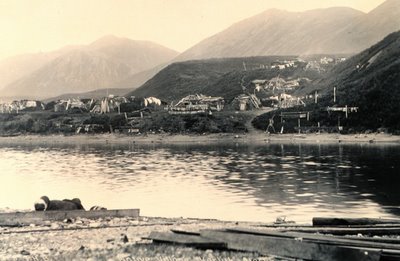A Salt Lake City attorney reads it in Japanese and reads nothing else. A BYU student downloaded it onto his MP3 player and listens to it wherever he goes. A Provo couple took their book, blanket and picnic basket to the park and read for 15 hours.Their reading would be more inspiring if it did not so perfectly fit Cabell's quip about it being better for people to read anything rather than not at all. "By similar logic it would be more wholesome to breakfast off laudanum than to omit the meal entirely."
Call them the "Book of Mormon-challenged."
All over Utah, many Latter-day Saints are desperately - some despairingly - racing to meet church President Gordon B. Hinckley's challenge, issued July 25, to read the Book of Mormon by year's end.
Wednesday, November 30, 2005
Sunday, November 27, 2005
Josia Gregg observed on page 154 of Commerce of the Prairies, an account of his travels to New Mexico in the 1830s, that "[c]hile verde (green pepper), not as a mere condiment, but as a salad, served up in different ways, is reckoned by [New Mexicans] one of the greatest luxuries."Mrs. Peculiar has some nice purple-red pods on to soak. It's good to be home.
Wednesday, November 23, 2005
Let us now recite:
Bulgarian terrors
To all who think right.
They claim that the Devil
Is God's elder son,
And on the same level
With the Three-in-One.
The sacraments mocking,
Creation they hate,
And thus are offending
Our Lord Incarnate.
Slowly, but exceeding coarse, my wheels grind. I would have done the Borborians except everything I learned about them was really, really icky.
Q.
A.
Monday, November 21, 2005
"Nobody can tell in which of the dozens of thousands of bottomless glacier crevices [sic] their frozen bodies lie."That's not how the Park Service usually phrases it. I like the Russian style.
Happy Thanksgiving!
Friday, November 18, 2005
Terry Teachout doesn't like him, but Terry Teachout never quoted Buffy, so to hell with him. I will now give you the secret to enjoying Akhnaten.
The prelude is eleven minutes and twenty-four seconds long. You should be able to sink three beers in this time. More alcohol if you're doing shots, but beer is AEgyptian, and you should claim to anyone who questions you that this is a ritual from archaic AEgypt to honor the spirit of Amenhotep III. It is not; the Prelude of Akhnaten serves the same purpose as the knee-plays of Einstein on the Beach: a convenient moment in which to down some pain-killing alcohol.
Now: wait for it. The scribe will begin speaking of the king. Apparently he flies like the zeret bird. No, I don't know what that means, but if you've taken my advice, you don't care. But, get up! Stand up when your archaic AEgyptian scribe is speaking to you! He goes to the sky [the king]. He goes to the sky [ibid.]. On the wind. (De capo).
The funeral of Amenhotep III is beginning. If you do not get up and shake your rump during the funeral of Amenhotep III, you are no true opera-lover. All the goths in the house: ninja dance! Let's see some white man overbite! Throw your hands in the air, like you just don't care.
You call that apathy?
Sing along. Don't worry about not knowing the words: they're mostly in archaic AEgyptian anyway. Contemplate that fact while considering also that this is Mr. Glass' most accessible opera. Keep dancing. You don't want Amenhotep III to go to the sky without a decent send-off, do you? Open are the doors of the horizon! If you really feel bad about knowing the words, they are: Ankh ankh, en mitak/ Yewk er heh en heh/ Aha en heh. Don't you feel stupid for asking? Also, note the absence of violins. Enjoy instead the silliest brass section, ever.
About eight minutes in to the nine minute funeral you will, if you are dancing correctly, start to feel a little winded. Go ahead and sit down. You've got a couple of hours to go. Oh look. Beer! Hurray beer!
And that is how to listen to Philip Glass.
Thursday, November 17, 2005
Saturday, November 12, 2005
8. Corsets, not bras. "By that I don't mean Victorian corseting," says Ms Goodman. "Corsets support your back as well as your chest, and don't leave red welts on your skin like bra elastic does. They made it hard to breath walking up hills, but I get short of breath doing that anyway. And most people feel sexy in a corset."I can only hope that this advice is taken to our nation's bosom.
Brief reviews of the latest great novels:
A Passage to India: caves are evil.
Their Eyes Were Watching God: Ooh, this was good. How I hate dialect!
The Autobiography of Alice B. Toklas: Gertrude Stein, I like you so much better now. But, dear heart, you might take your own advice. Remarks are not literature. This was actually the one I enjoyed most of the three. Alice is marvelously gossipy, and I loved the way that she was shown only in reaction to those around her. But either be against commas, or use them correctly. Consistency is all I seek.
 A straw bale house in Gunnison, Colorado that my wife and I visited. You want pictures of joists? Because I've got pictures of joists. I could show you some serious 10x10s, if that's what you're into.
A straw bale house in Gunnison, Colorado that my wife and I visited. You want pictures of joists? Because I've got pictures of joists. I could show you some serious 10x10s, if that's what you're into.They dye the sky in Gunnison that color, by the way. It's not natural.
I attended a Straw Bale Construction workshop today, although "seminar" would be apter, since to me "workshop" implies activity beyond reading, videos, and discussion. I don't hate these things, but it would have been nice to get my hands dirty. Despite the price tag, the workshop had a goodly number of attendees. Straw bales are cheap. It's just the learning that gets you.
For those of you who have no idea what I'm talking about, straw bale construction uses... straw bales... in construction. They're often used where otherwise sheetrock and insulation would go, but they can be load-bearing, showing surprisingly little compression. If log cabin construction is Tinkertoys, straw bale is Lego. A straw bale wall generally makes excellent insulation, with an R value from 30-50 depending on bale density and alignment. A lot of this insulative value comes from the thickness of the bale: straw bale walls can be around two feet thick. Two feet of fiberglass insulation would be pretty good, too, but straw is cheap. Bales run from two to six bucks here in Oregon, depending on the season and location.
A big draw for would-be bale builders is the environmental aspect. Straw is a waste product that is otherwise burned or buried (there are a few other uses, but I've yet to hear of anything widespread). It's organic--which to me means "carbon based", but apparently has some other meaning, if people can apply it to cheese puffs, bicycles, and water--and sustainable. Sustainability seems to me an insufficient criterion for a lifestyle. I can imagine a number of low-entropy states which are sustainably unpleasant. But it is nice to be using a material that will give us twenty or thirty years of use (or more!), and can then be spread on the garden to compost. So while for me the main attractions are price and ease of assembly, I acknowledge that it's a bonus to hold a hippie-lifestyle high card.
Straw bale is not actually much cheaper than traditional construction. In the long term it will save money of energy, but, apres Keynes, in the long term we're all dead. That it lends itself to small crews and owner-builders, however, potentially saves money on labor costs.
The rules for building with straw are the same as the rules for raising mogwai, except that instead of "don't feed them after midnight" you have "don't set them on fire". So I guess really just, "never get them wet". Oh, and both can be corrected with a sledgehammer if they get out of line.
Excess of moisture is how a straw bale house dies. Above seventy percent relative humidity, mold begin to grow, and the bale begins to suffer. The air which passes relatively freely from outside to inside (another advantage of straw bale construction is the air exchange) starts to smell a little off. The bale loses structural integrity. The walls collapse. Everyone dies. It's actually much worse than the danger of fire. Straw bales, expecially after they've been stuccoed, resist fire rather well. But because of the danger of rotting bales, the lowest course needs to be twelve to fourteen inches off the ground.
This, of course, is why I chose to move to the Pacific Northwest and build one. Sometimes I am rather contrary. But I was pleased to learn that any number of such houses have already been built in and around Portland, and that the humidity remained within safe limits. I don't like being the first penguin to jump off the ice. I like things safe, and established, preferably for at least two millenia. Building with straw fits nicely into that last category.
However, I am still a little suspicious of load-bearing bale walls. It just doesn't seem right to me, and all the successful Nebraskan churches in the world won't change my mind. I prefer a straw bale wrap, where the house is build using post-and-beam construction, and the bales are placed around the walls.
Anyway, my notebook is full of new books to read, magazines to subscribe to, and now-indecipherable notes like "30 lb. tar paper! Stem." One enjoyable thing about this sort of workshop is how easily it gets off topic. The same crowd drawn to straw bale workshops knows a good bit about grey-water systems, bottle walls, cobb construction, composting toilets, living roofs, passive and active solar power, and the multifarious tasks hemp can accomplish. Hearing about all these wonderful techniques, I immediately start building tree-houses, earthships, hobbit holes, and other castles in the sky. I want to use old blue jeans as insulation, and salvaged telephone poles as load-bearing posts. But no matter how much I like the subject, I cannot go eight hours of discussion with strangers without wanting to bite someone. Please note, fellow bale-enthusiasts: there are stupid questions, and today you asked a number of them.
One of my more pleasant summers was spent building an addition to a home. I hope my wife and I can experience that same satisfaction, along with putting a roof over our heads and four walls around us. We haven't studied floors yet.
Thursday, November 10, 2005
"il fait la gueule le mouton"
Brings back some fine memories. These folks saw far more vegetables than I ever did, though. Mouton au riz, ha! And where, oh where are the marmots, who are really much tastier than the sheep?
What to do for entertainment after such repasts? Gamble with the sheeps' bones, of course! Here are some rules to North-Central Asian knucklebone games. Or why not provide some atmosphere by learning to throat-sing?
Also worth a look are Mongoliac and Throat Singing, both blogs by folks on extended stays in Mongolia and Tuva, with many fine photos.
If you like the Kazakh wall hangings, please ask Steve to sell you some.
Ah, proper Siberian camels, not those mangy desert jobbies!
I do hope the current appeals for friendship with America get a little mainsteam airtime. I fear they won't, as the official media stance seems to be that all Moslems hate us because we oppress them, each and every one. But Iraq's Kurds seem to feel quite differently. It's really appalling that one of the Middle East's bright spots is forced to pay for good press in the States.
Meanwhile, the Azeris would like some of that assistance as well. It will be to our immense shame if we don't come through for them. If Stephen Green is correct that we're really fighting a media war, we cannot afford to pass up this opportunity. The picture says it all.
Wednesday, November 09, 2005
Steve posted today on the shameless deception which is Save the Falcons. This whole "Arabs are stealing our raptors" delusion has been cropping up periodically for decades now, often doing real damage to the lives and livelihoods of honest American falconers. Perhaps Steve can write on the travesty of Operation Falcon, in which numerous falconers were framed by federal agents. The unnerving thing about this disinformation is that it does show an ability to inspire a very peculiar hysteria in well-meaning people, mostly people who know little about birds and nothing about the Middle-East or falconry. Certainly anyone who as ever witnessed actual falconry, in all its glorious inefficiency, must doubt claims that falcon-hunts could possibly devestate entire Central Asian ecosystems, as Save the Falcons repeatedly asserts. These are not credible people. For instance, here is an article mainly about information technology used one of S.T.F.'s leaders business; it is not a falconry article, nor an environmental article. Note the proud assertions: "He has supplied falcons to the royal families of Saudi Arabia and the United Arab Emirates. Sixty percent of Khalsa's clients live in the Middle East"
Why should this man be trusted to fight falcon smuggling?
For further inspiration, here's an account of the Bundys, inhabitants of the Canyon's Northwestern rim, shootin' rattlesnakes with six shooters and much more. Bundyville is now disappointingly known as Mt. Trumbull.
Saturday, November 05, 2005
Steve was kind enough to send an email my way in which he praised the St. John's education. He made the excellent point that one can, these days, be an expert in one's field while still having no understanding of the civilization on which that field is predicated. Biologists may not know philosophy; philosophers know just enough biology to get into trouble *coughpetersingercough*; and the great and astounding history of our sciences is related in simplified, poorly written books whilst eminently readable classics like Faraday's Chemical History of a Candle or Euclid's Elements languish.
This post is not, however, Johnny triumphalism. I want instead to explore the weaknesses of the St. John's experience. I am, of course, a bitter, partisan voice often choked with my own bile. But the Great Books program, as fine a paedagogical device as it is, has several immanent flaws.
It breeds generalists without real depth. It breeds elitism without bringing forth the elite. It breeds complacency in the face of real life and death, and an unexamined belief that the contemplative life is not only superior, but that the vita activa is corrupt and corrupting. It's this last quality that I want to examine most closely.
A certain fellow stalks the polis these days, declaring that all action is sinful. A sort of secular Jain, he has no advice to offer, only his criticism of any course taken. In his view, death by inanition is preferable to making an omelet, lest we break eggs.
The life of a spectator is an easy one, which is why so many of us choose it. But as distracting as this attitude is in political life, it is disastrous in the daily grind. And this attitude is fostered by the Great Books program.
Johnnies read a great number of Greek tragedies. We read Job, King Lear, and Anna Karenina. And I will claim right now that none of these works--not one--has ever helped me deal with the tragedies of my own life. Even the Greeks failed to capture the essence of the blind, murderous world we live in. I read Job on my wedding day, to calm myself. "At least I don't have boils," one can almost always say.
Instead of re-forging the bonds of humanity, reading these works let too many of us cast off those bonds, in exchange for pretend pathos, for the glib pleasure of sympathy with characters to whom we need offer neither charity nor concrete assistance. Instead of drawing us together, as I believe the tragedies must have drawn together the audiences before whom they were performed, the necessarily solitary act of reading and contemplating led me, at least, to a solitary existence.
I want to relate the most truly communal experience--not a feeling of friendship with individuals, but of being part of a collegium--I had at St. John's. It was the night before Winter Break began, and the college was showing The Grinch Who Stole Christmas and It's a Wonderful Life. I went there with several friends of mine, and we found seats in the crowded hall.
I am a sucker for movies. I cheer every time the Death Star gets blown up. I tear up when Jim Craig rides down that hill in The Man From Snowy River, and I think Casablanca is the most romatic movie ever made. I make muffled shrieks when the chair is turned around in Psycho. So it needs little thought to conclude that, by the end of It's a Wonderful Life, I was blubbering.
But when the lights came up and I looked around, so was everyone else. The cynical, all-knowing group of college students had been transformed by what is (let us be honest) a sappy, sappy movie. Neither age nor sex was cause for exemption. Sitting next to each other, students hugged and wept.
I contrast this with the idiotic, sybaritic attitudes we most of us affected most of the time, and I conclude that some element of our education was missing. The Greek tragedies never united us in seminar, aghast at our own mortality, the way that movie did. For all the genius poured into the Great Books over millenia, not one of them can teach you how to deal with the death of a loved one. This lack would not make me quite so angry if it had not been so strongly implied that this could be taught.
A certain sort of clever person will learn to use their reading to distance themselves from anything that might affect them. They become adept at drawing parallels between life and reading, that they might reduce everything to a text, and themselves to critics. The critic's point of view, detached and near-omniscient, is a great temptation to those of us particularly susceptible to sloth. It requires no action.
I believe in an immutable, underlying reality. This belief occasionally makes me want to hit people by way of proselytization. It's difficult to refute a yop cha chirugi. I recognize this tactic as self-defeating, but that doesn't remove the temptation. The contemplative life implicitly denies those who act the right to define their own lives, by sitting in judgment on their actions.
It allows one a relaxed, superior attitude. When a friend is suffering, it's too easy for us to distance ourselves, not only emotionally but with regard to our Will, and transform the trouble into an intellectual problem. But for certain problems there is no solution. Death stands grinning at the end of every life, and all the philosophical practice in the world won't accustom you to that fact. It is a part of human nature to fear death, and to suffer as we watch the people we love die. Anyone who says differently is selling something.
I cannot adequately express my love for the people in my life who have died, let alone those who are still alive. I hope that they are gathered in the bosom of our ancestors. But that hope does nothing to alleviate the pain of death. A refusal to confront this pain in all our impotence is at the heart of the desire for a contemplative life. I assign psychological causes rarely, but this one I will stand behind.
So, having wandered far afield, to return: the St. John's education teaches a great deal of history, but does not and cannot make that history live in us. It offers what it claims are insights into the human condition, but what can also become barriers between us and the world. For every ten thousand would-be Socratics, there's not one that would share his cup.
I am cowardly in the face of suffering. It makes me want to turn inwards in fractal self-reflective thoughts. It is this tendency which is fed and nurtured at St. John's, despite the best efforts of tutors and faculty. Excellent in argument, useless in action.
Of course there are exceptions, and you mostly likely are one if you read this blog and are a Johnny (not, of course, due to any innate quality of this blog, but because I know most of you, and you are all wonderful. Hi!). St. John's does leave one in a position to gain real understanding and to make real changes in the world. But one must recognize when the time has come to act, and to act effectively. Too often we act out, trying not to accomplish anything, but to gratify ourselves emotionally.
Friday, November 04, 2005
Good luck with that.
Thursday, November 03, 2005
Instead, I will be enjoying National Novel Reading Month, which may actually exist, but hell if I'm going to do research on a thing like that. I will read a novel every day this month. Not Brothers Karamazov, but not the new Tamora Pierce, either. Today I finished My Antonia, which I enjoyed a great deal more than The Awakening, but then I have an irresponsible prejudice against suicide as an ending. Now I'm starting A Passage to India, to be finished tomorrow.
If anybody can think of a way for me to make money off this, or even an iPod Nano, that'd be nice.
Also I think it is extremely chintzy that The Awakening, published in 1899, was included on a list of the 100 best novels of the 20th century.
Wednesday, November 02, 2005
I really like the "Ballad of Sir Isaac Newton", too.
Tuesday, November 01, 2005
Common, known
With the color of fox fur
Of R. G. Wasson, American (living)
With yellow skin
With yellow skin
With the color of a dry vine leaf
With arid hair, not viscid
Little dry Omphalia
Small dry
Pertaining to the wood
Of the Zapotec, people of Mexico
of S. M. Zeller, American (1885-1948)
Seasoned with ginger
Pertaining to zone
With zones







